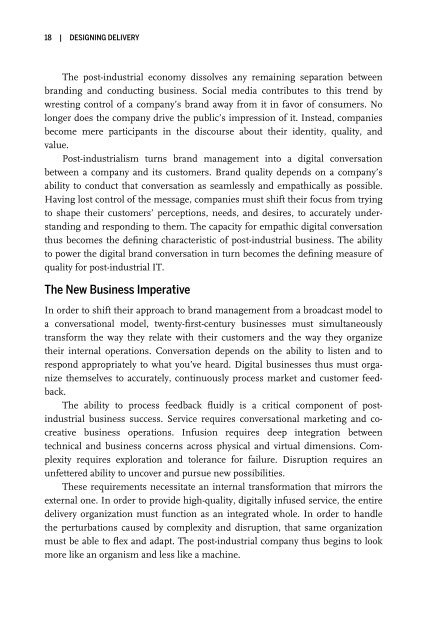Designing Delivery
1Tox6aC
1Tox6aC
You also want an ePaper? Increase the reach of your titles
YUMPU automatically turns print PDFs into web optimized ePapers that Google loves.
18 | DESIGNING DELIVERY<br />
The post-industrial economy dissolves any remaining separation between<br />
branding and conducting business. Social media contributes to this trend by<br />
wresting control of a company’s brand away from it in favor of consumers. No<br />
longer does the company drive the public’s impression of it. Instead, companies<br />
become mere participants in the discourse about their identity, quality, and<br />
value.<br />
Post-industrialism turns brand management into a digital conversation<br />
between a company and its customers. Brand quality depends on a company’s<br />
ability to conduct that conversation as seamlessly and empathically as possible.<br />
Having lost control of the message, companies must shift their focus from trying<br />
to shape their customers’ perceptions, needs, and desires, to accurately understanding<br />
and responding to them. The capacity for empathic digital conversation<br />
thus becomes the defining characteristic of post-industrial business. The ability<br />
to power the digital brand conversation in turn becomes the defining measure of<br />
quality for post-industrial IT.<br />
The New Business Imperative<br />
In order to shift their approach to brand management from a broadcast model to<br />
a conversational model, twenty-first-century businesses must simultaneously<br />
transform the way they relate with their customers and the way they organize<br />
their internal operations. Conversation depends on the ability to listen and to<br />
respond appropriately to what you’ve heard. Digital businesses thus must organize<br />
themselves to accurately, continuously process market and customer feedback.<br />
The ability to process feedback fluidly is a critical component of postindustrial<br />
business success. Service requires conversational marketing and cocreative<br />
business operations. Infusion requires deep integration between<br />
technical and business concerns across physical and virtual dimensions. Complexity<br />
requires exploration and tolerance for failure. Disruption requires an<br />
unfettered ability to uncover and pursue new possibilities.<br />
These requirements necessitate an internal transformation that mirrors the<br />
external one. In order to provide high-quality, digitally infused service, the entire<br />
delivery organization must function as an integrated whole. In order to handle<br />
the perturbations caused by complexity and disruption, that same organization<br />
must be able to flex and adapt. The post-industrial company thus begins to look<br />
more like an organism and less like a machine.


